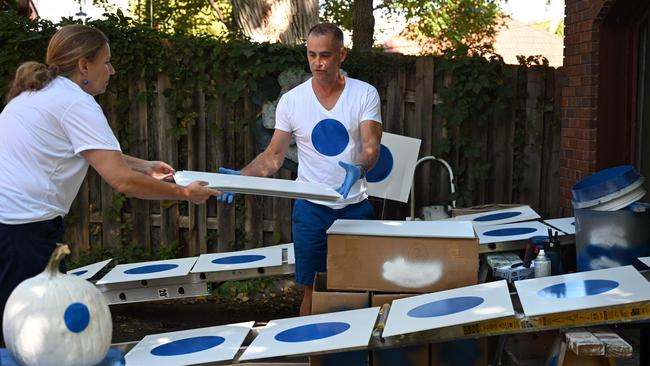Nebraskans could be unwilling kingmarkers in the US elections
Unique polling rules mean Omaha might cement a Kamala Harris win or trigger a nightmare tie. Residents fear the responsibility.

Nice, normal and quiet is how Nebraskans most like to be described.
Yet in a knife-edge US presidential election that is anything but nice and normal, Nebraskans find themselves reluctantly thrust into the spotlight.
The race is now so close between Kamala Harris and Donald Trump that the single electoral college vote from Nebraska’s swing city of Omaha could end up deciding the winner.
The intense fight for that vote has seen both the Democratic and Republican campaigns pour staff and millions of dollars into the state.
Not that most Nebraskans are rushing to embrace the role of kingmaker. “I’d hate Nebraska to have that stain … of being the decision-maker,” said Bruce Karsk, 71, on a warm autumnal evening in Omaha.
“We’ve only got five electoral votes. We don’t need that attention, we’re a little nice, quiet, sleepy state, we do things right, we’d like to stay that way. A big voice is not our style.”
Omaha finds itself in this political predicament as a result of a quirk of Nebraskan election rules.
Rather than choosing its president by counting up the nationwide popular vote, America has an electoral college – a system in which each state is granted a certain number of votes depending on the size of its population.
In most states, the winner of the popular vote claims all of its electoral college votes, adding them to their tally in the race for the White House.
There are 538 electoral college votes in total, meaning if a candidate receives 270 votes, they win the presidency.
Yet Nebraska is one of only two states, along with Maine, to award its electoral college votes by congressional districts rather than winner-takes-all. Nebraska has just five electoral college votes to offer. Four districts are heavily red (Republican); none is blue (Democrat); but Omaha – Nebraska’s 2nd congressional district, or NE-02 – is a purple district: it changes hands regularly.
Trump won it in 2016, Joe Biden flipped it back four years ago by just 22,000 votes – creating what is now “the blue dot” in a red Republican state.
To the horror of election experts, polling in the seven swing states (Arizona, Georgia, Michigan, Nevada, North Carolina, Pennsylvania and Wisconsin) is beginning to point to a tie – the first in a presidential election in 200 years. Harris will win 269 electoral college votes if she wins the three swings states in the “rust belt” – the former industrial heartlands – where she now leads: Pennsylvania, Michigan and Wisconsin. If Trump takes the four warmer “sun belt” swing states, Arizona, Nevada, North Carolina and Georgia, and he is now ahead in three, he’ll be on 268.
Winning Omaha’s single electoral college vote would take Harris over the line. If Trump wins it, the race would be tied and have to be settled by a highly controversial vote in congress.
Nebraska is the least-visited state in the US and one of its most sparsely populated, with just 26 people per square mile. The Pentagon bases its nuclear command and missile silos here, and it is where then president George W. Bush was flown to for safety after the 9/11 attacks.
Corn is the state’s biggest export. Omaha is its only major city and home to a quarter of its 1.9 million population. Aaron Sanderford, who has reported on politics for the Nebraska Examiner for two decades, has never seen an election like it. “The money that’s pouring in is really incredible,” he said. “We’re talking an economic impact in the tens of millions.”
So far, the Harris campaign and its allies have booked $US9m ($13.3m) of media ads in Omaha, while Republicans have spent $US 5.8m.
Trump and Harris are both expected to hold rallies in Omaha before polling day, the first time since the 1960s when both candidates have visited the city.
The latest polling in Nebraska gives Trump a 20-percentage-point lead across the state but Harris a nine-point lead in the NE-02 district.
Omahans are already fed up with it all, and there are three long weeks to go.
“There are so many ads, Harris and Trump,” said Isabelle Harms, 24. “Whenever you turn anything on, it’s just everywhere – Instagram, YouTube. It’s tiring.”
The latest battlefield in Omaha has become the suburban front lawn. Harris supporters struck first when Jason and Ruth Brown painted a blue dot (for NE-02) on a white background and put their sign up outside their home.
“We were watching the Democratic convention. Kamala said it was important to just do something,” said Jason Brown, 53, a small business owner.
“It started with my neighbour wanting one, then we had to do 10 more, then 100. We’ve done 4000 now and just put in an order for 5000 more.”
Trump supporters have hit back, with a block of red in the shape of Nebraska. A red dot on a white background was ruled out as it looked like the flag of Japan.
The yard sign war is only adding to neighbourly tensions “We’ve had a few naysayers yelling at us,” said Theresa Thibodeau, who designed the Republican sign. “But we tell them we’re expressing our first amendment right (to freedom of speech), just as you are.”
She believes the chasm will heal one day. “We have this term, ‘Nebraska nice’. Although we’ve seen divisions come into Nebraska a little bit, our people are better than that. Once this election is finished, we’ll come together as a state.”
THE SUNDAY TIMES


